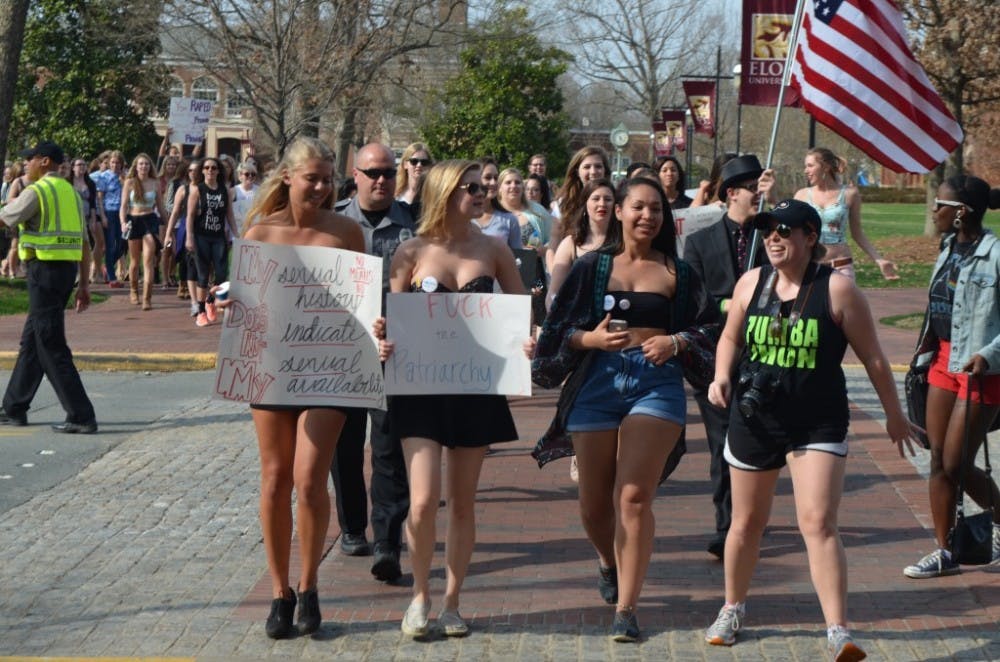Every two minutes an American is sexually assaulted, according to data collected in a recent study done by the Rape, Abuse and Incest National Network. That means roughly 237,868 American people will fall victim to an act of sexual assault this calendar year. Additionally, 80 percent of those 237,868 victims will be under the age of 30. There are 5,599 students enrolled at Elon University, meaning it is more than likely there are survivors of sexual assault within our student body.
Elon makes every effort to ensure university policies on sexual assault are visible to its students, faculty and staff. The university’s website clearly outlines all regulations and policies regarding sexual assault in addition to offering students various courses of action if they have been sexually assaulted.
Though the university posts its policies online and offers different avenues for reporting these incidents, it does not take a proactive approach to the problem. The current practices in place are passive and do nothing to harbor victims after the initial assault. Elon also does little in the way of directly educating students about what sexual assault is.
http://www.youtube.com/watch?v=mD5aSh_qjTQ
Thankfully for the university and the student body, student organizations such as SPARKS (Students Promoting Awareness, Responsibility, Knowledge, and Success) and EFFECT (Elon Feminists for Equality, Change and Transformation) play an active role in teaching students about consent and what qualifies as sexual assault. But without these student organizations, there would be no active educational initiative on campus that discusses sexual assault and that is a problem.
Earlier this month, Harvard University created a task force with the singlular goal of addressing the occurrence and prevention of sexual assault on its campus.The Harvard task force is comprised of students, faculty and staff who all work together to find the most effective way to combat this problem. Not only is this a huge step for the university because it seeks to solve the problem, but it also acknowledges the problem, which Elon needs to do before it can work to solve it.
Although Elon is making progress by including high-level administrators in student-run awareness campaigns, such as EFFECT’s “white board campaign,” the university is still dragging its feet when it comes to publically confronting this problem.
Elon is simply covering up the issue of sexual assault with a sea of rules and regulations rather than admitting there is a problem. This tactic makes no effort to fix the problem and does not prevent future attacks from happening.
As a university that is unafraid to make changes to remain relevant and attractive to both current and prospective students, Elon should have tackled this issue long ago. The longer the university waits to publically acknowledge that a problem exists on this campus, as it does on almost every college campus, more members of our community will fall victim to sexual assault.
The actual act of sexual assault is frequently just the beginning of several issues for the victim. Victims are three times more likely to suffer from depression, six times more likely to suffer from post-traumatic stress disorder and four times more likely to contemplate suicide, according to the Center for Disease Control.
Underneath the facade of wild parties, mass consumption of alcohol and loose inhibitions that appear to dominate the weekend nightlife at Elon lies a much more serious problem. Unlike the risks and laws regarding alcohol consumption that are often taught in classrooms, this equally pressing issue is more often than not brushed under the rug to avoid “awkward” or “frowned upon” discussions.
Sexual assault is not receiving the attention that it needs to in order for there to be effective change made. Elon’s administrators should welcome the challenge of tackling this issue in the same fashion they tackled the rapid expansion of our campus. Slight changes to the first year orientation program would have lasting effects on the prevalence of sexual assault on the campus. That, combined with the need for administrators being willing to publically condemn this issue, would forever shape the campus for the better.
Members of the Editorial Board are Nick Foley, Jonathan Black, Katy Canada, Alex Francis, Greg Honan and Lauren Phillips.


